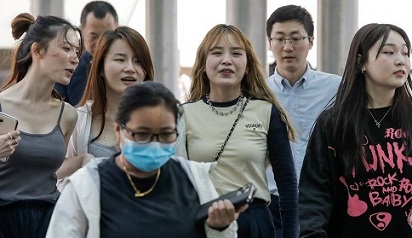Hong Kong Battles Rising COVID-19 Infections Amid Overwhelmed Healthcare System And Waning Immunity
COVID-19 News - Hong Kong Apr 25, 2023 2 years, 8 months, 1 week, 3 days, 1 hour, 43 minutes ago
COVID-19 News: Hong Kong is witnessing an alarming rise in COVID-19 cases, with 259 new PCR-confirmed COVID-19 infections and 11 deaths reported in the last 24 hours. While the government officials have not released data on Rapid Antigen Testing, it is worth noting that only hospitalized cases are being tested using PCR protocols, and not always consistently. The current hospital bed occupancy in Hong Kong has reached an alarming 108%.
 Most Are Maskless In Hong Kong These Days
Most Are Maskless In Hong Kong These Days
Pic Credit: Getty Images
Professor Benjamin Cowling, an epidemiologist at the University of Hong Kong, has observed a spike in COVID-19 cases. Based on recent calculations from the university, the infection rate over the past week was around 1%, translating to nearly 15,000 new cases daily.
Local physicians and health experts are worried that this will significantly burden the public healthcare system. Furthermore, with flu cases also rising, the potential impact of COVID-19 and flu cases simultaneously could really stress out the public healthcare infrastructure.
Assistant Professor Dr Kwok Kin-on from the Faculty of Medicine at the Chinese University of Hong Kong anticipates that COVID-19 cases will continue to rise due to waning immunity and decreased vaccine uptake. Nevertheless, he points out that the ratio of severe cases in second infections is lower than in the first infection, which might keep the public healthcare system safe for now.
The University of Hong Kong's Faculty of Medicine has been recruiting 10,000 volunteers to undergo regular COVID-19 antigen testing since last year. Based on the participants' test results, the university has calculated the real-time infection rate. Professor Cowling revealed that the infection rate over the past week was approximately 1%, which could mean up to 15,000 new cases per day in the community.
Professor Cowling also mentioned that COVID-19 infections have been fluctuating in waves over the past year, with the reasons behind this pattern remaining unclear. However, considering the constant mutations of the virus and the weakening immunity to it over time, he expects three to four waves of infections in the coming year.
According to local Hong Kong
COVID-19 News coverages, in response to the recent surge in infections, the Hong Kong's government has allowed private doctors to order more COVID-19 oral drugs, including Paxlovid and molnupiravir. Family doctors had warned that they were running out of these oral antivirals as cases climbed over the past two weeks. The government has now increased the number of standard courses of each drug that can be requested per order to 10, up from six.
The Department of Health has issued a letter notifying private doctors of the new arrangement and reminded them that the oral drugs requested could only be prescribed to eligible infected persons. Infected residents aged 60 or above and younger patients with high-risk factors such as weak immunity are eligible for the oral drugs, according to government guidelines.
Many GPs and
family doctors running small clinics highlighted the shortages of oral drugs, noting that the number of COVID-19 patients visiting their clinics over the past 10 days had risen from two to three daily to about 20, with approximately 30% of them eligible for the treatments.
GPs and family doctors believe the boost in supplies will be sufficient to tackle the current situation but suggests that the authorities allow doctors to make additional orders even before delivery of the previous one to cope with unexpected needs.
The government spokesman stated that the authorities would continue to monitor the situation and make adjustments on the Electronic Health Record Sharing System platform, depending on the epidemic situation, drug usage, and demand.
Molnupiravir and Paxlovid became available locally in Hong Kong in late February and mid-March last year, respectively, during the fifth wave of infections. Both drugs were initially provided to public hospitals, designated clinics for COVID-19 patients with mild symptoms, and homes for the elderly before being given to private doctors and hospitals.
For the latest
COVID-19 News, keep on logging to Thailand Medical News.
